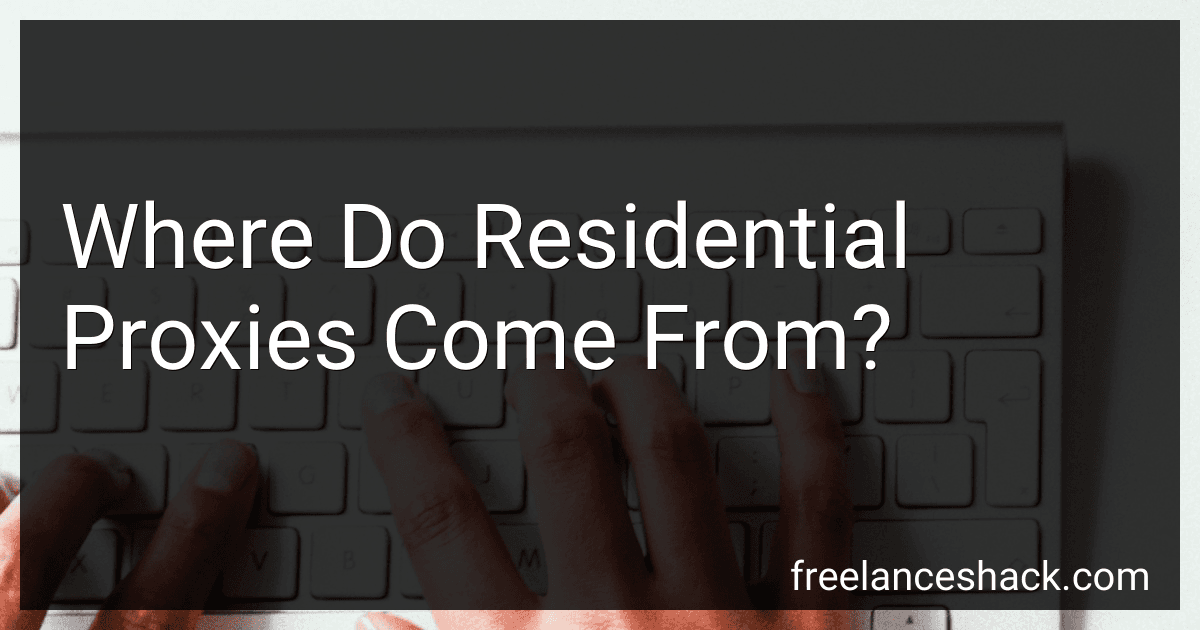Best Residential Proxy Solutions to Buy in November 2025

One Way Privacy Window Film Sun Blocking, Heat Blocking Window Tint for Home See Out But Not in, Static Cling & Anti UV, Black-Silver,17.5 Inch x 78.74 Inch
-
PREMIUM MATERIALS: DURABLE PET/PVC ENSURES SUPERIOR INSULATION & CLARITY.
-
UP TO 80% HEAT REDUCTION: ENJOY COOLER INTERIORS WITH SUN-BLOCKING FILM.
-
STATIC CLING DESIGN: EASY APPLICATION WITHOUT GLUE OR PROFESSIONAL HELP!



One Way Privacy Window Film Sun Blocking, Heat Blocking Window Tint for Home See Out But Not in, Static Cling & Anti UV, Black-Silver,35.4 Inch x 196.8 Inch
- SUPERIOR INSULATION AND DURABILITY WITH HIGH-QUALITY PET & PVC.
- BLOCKS 80% OF HEAT AND 99% OF HARMFUL UV RAYS FOR COMFORT.
- EASY STATIC CLING DESIGN ENABLES HASSLE-FREE, DIY INSTALLATION.



HOME DEPUTY Solar Flag Pole Light - 111 LED - Brightest Outdoor Flagpole Light for Most In-Ground Flagpoles - Dusk to Dawn Lighting - Pole Topper - Rechargeable Battery
-
10-HOUR POWER: ENJOY LONG-LASTING LIGHT FOR YOUR FLAG, DAY AND NIGHT.
-
WIDE COVERAGE: 111 LEDS ENSURE FULL ILLUMINATION OF YOUR FLAG.
-
EASY INSTALLATION: TOOL-FREE SETUP IN JUST 2 MINUTES-SIMPLE AND FAST!



Window Privacy Film, Sun Protection One Way Window Film.
- SUPERIOR INSULATION & DURABILITY WITH FREE WINDOW TINT KITS INCLUDED!
- BLOCK 80% HEAT, 99% UV RAYS FOR A COOLER, SAFER INDOOR SPACE.
- EASY STATIC CLING APPLICATION FOR HASSLE-FREE PRIVACY AND STYLE!


Residential proxies are IP addresses that are obtained from internet service providers (ISPs) through real residential devices such as laptops, computers, and mobile phones. These proxies are sourced from regular consumers who have opted to share their internet connection with proxy companies.
When individuals choose to become part of a proxy network, they provide permission to route their internet traffic through a proxy server. This enables their residential IP address to be used by others for various purposes such as web scraping, ad verification, and anonymity.
Proxy companies establish partnerships with these residential users, often known as "residential proxy providers" or "proxy peers." These providers lease their residential IP addresses to proxy companies, which then distribute these IPs to their clients. The number of available residential proxies depends on the number of providers and the agreements made between the proxy company and the residential users.
By accessing the internet through residential proxies, users can mimic regular consumers and avoid being detected as bot or automation activity. This allows for verified access to websites without triggering security measures like captchas or IP bans.
Overall, residential proxies come from a network of regular users who have agreed to share their IP addresses, offering a legitimate and unblocked way to access the internet anonymously for various applications.
What are the best practices for using residential proxies?
Here are some best practices for using residential proxies:
- Choose a reputable proxy provider: Opt for a reliable residential proxy provider that ensures the legitimacy and quality of their IP addresses. Research and compare different providers to find the one that meets your specific needs.
- Rotate proxies regularly: To avoid detection and maintain a higher level of anonymity, regularly rotate the residential proxies you use. This helps distribute requests across different IP addresses and reduces the chances of being blocked or flagged.
- Use different locations: Utilize proxies from different geographic locations to simulate real user behavior and access location-specific content. It also helps in avoiding geographic restrictions imposed by websites or services.
- Monitor proxy performance: Keep track of proxy performance by monitoring speed, uptime, and reliability. Proxies with slow speeds or frequent downtime can significantly impact your browsing experience and productivity.
- Respect website policies: Always comply with the terms of service and policies set by the websites you visit through proxies. Ensure your activities do not violate any rules or lead to abuse. Not engaging in any malicious or illegal activities will help maintain the reputation of the proxies you use.
- Implement proxy rotation rules: Define rules for rotating proxies based on factors such as time intervals, number of requests, or specific events. This automation reduces manual effort and ensures proxies are utilized efficiently.
- Test and verify proxies: Before integrating residential proxies into your workflows, test them on various websites and services to ensure they work as intended. Verify if they provide the expected level of anonymity and functionality.
- Optimize connection settings: Configure your proxy settings correctly in the software or application you are using to maximize performance. Ensure your connection settings align with the requirements and recommendations of your proxy provider.
- Use proxy management tools: Consider using proxy management tools or software that simplify the process of handling, rotating, and managing residential proxies. These tools automate repetitive tasks and provide advanced features for better control and monitoring.
- Understand legal considerations: Be aware of the legal implications of using proxies in your jurisdiction. Different countries and regions have different laws and regulations concerning the use of proxies, and it's important to use residential proxies within legal boundaries.
Remember that residential proxies are meant to provide anonymity, but it's crucial to use them responsibly and ethically.
What is the legality of using residential proxies?
The legality of using residential proxies may vary depending on the country and the purpose for which they are being used. In many countries, it is generally legal to use residential proxies for activities such as browsing the internet, accessing geo-restricted content, or anonymizing online activities.
However, it is important to note that the legality can change based on the specific activities being carried out using the proxies. For example, using residential proxies for illegal activities like hacking, fraud, or sending spam emails is typically prohibited and can lead to criminal charges.
Moreover, while using residential proxies may be legal, the specific terms of service of online platforms or websites that you access through proxies may prohibit their usage. It is advisable to review the terms and conditions of such platforms to ensure compliance with their policies.
In summary, using residential proxies in a legal and responsible manner for personal use is generally allowed in most places. However, it is crucial to consider local laws and the specific activities being conducted to ensure compliance.
What is the average lifespan of residential proxies?
The average lifespan of residential proxies can vary widely depending on several factors including the provider, usage patterns, and the quality of the proxies. Generally, residential proxies tend to have a relatively short lifespan compared to other types of proxies.
On average, residential proxies can last anywhere from a few minutes to a few hours. This is because residential proxies are IP addresses that are assigned to real residential devices, such as personal computers or mobile devices. As people turn off their devices or switch networks, the IP addresses associated with residential proxies change frequently.
However, certain premium residential proxy providers offer more stable and longer-lasting proxies. These providers manage a large pool of residential IP addresses and have sophisticated systems in place to rotate and maintain the proxies, ensuring a longer lifespan for their proxies. It is always recommended to choose reputable and reliable proxy providers to ensure better longevity and performance.
How to handle IP blocks with residential proxies?
When using residential proxies, it is possible to encounter IP blocks due to various reasons such as multiple requests from the same IP address, suspicious activity, or the website's anti-scraping measures. Here are some tips on handling IP blocks with residential proxies:
- Rotate IP addresses: Most residential proxy providers offer IP rotation functionality, allowing you to switch to a different IP address with each request. By rotating IPs, you can avoid triggering any anti-scraping mechanisms that might result in blocks.
- Reduce request frequency: Adjust the scraping or automation script to lower the number of requests sent within a specific time frame. By slowing down the requests, you can prevent your IP address from being flagged for suspicious activity.
- Implement delays: Introduce randomized delays between requests to simulate human-like behavior. This helps prevent detection or suspicion of automated activity, reducing the chance of being blocked.
- Use session management: Maintain a session or reuse the same IP address across multiple requests. This way, you can establish a level of trust with the target website, reducing the likelihood of getting blocked.
- Clear cookies and cache: Regularly clear cookies and cache to make sure you are not using old or suspicious data that could trigger an IP block.
- Use different proxies: If you encounter a persistent IP block, consider changing to a different residential proxy provider. Different proxy networks may have varying levels of reputation and more adaptive IP rotation techniques that can overcome blocks more effectively.
- Monitor IPs and response codes: Keep track of the IP addresses being used and the response codes received during scraping or automation. This will help you identify patterns, detect blocks, and take appropriate action to avoid further restrictions.
Remember, even with residential proxies, there is no guarantee of complete avoidance of IP blocks. It is important to stay vigilant, adapt your strategies, and comply with website terms of service to minimize the risk.
What is the geographic distribution of residential proxies?
The geographic distribution of residential proxies can vary depending on the proxy service provider. However, in general, residential proxies are distributed across different countries and regions worldwide. These proxies are typically sourced from individuals who willingly share their IP addresses, making them appear as regular residential users.
Residential proxies can be found in numerous countries, including but not limited to the United States, United Kingdom, Germany, France, Canada, Australia, Japan, and Russia. The availability and concentration of residential proxies may vary among these countries and can change over time. Some proxy providers may offer a broader range of locations, while others may focus on specific regions or countries.
The distribution of residential proxies is influenced by several factors, including the number of users in a particular region, internet infrastructure, and the willingness of individuals to share their IP addresses. It is important to note that the exact distribution and availability of residential proxies can change, so it is advisable to check with specific proxy service providers for their current offerings.
